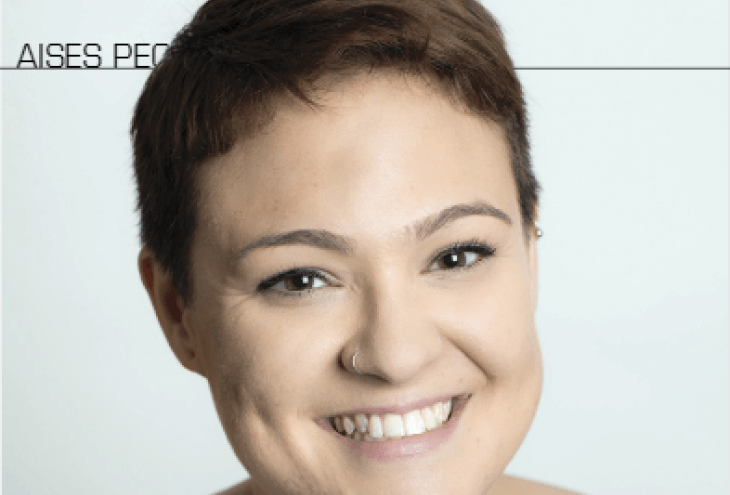She’s just 28, yet so much has happened in the last dozen years that Marrissa Hellesen’s life reads more like a suspense novel. Hellesen’s story includes her leaving school in the eighth grade, earning a GED when homeschooling didn’t work out, and then nearly failing in college. The main theme in her life, though, is perseverance. She refused to give up, and she paid attention to the lessons life was teaching her along the way.
At one job Hellesen noticed coworkers struggling from paycheck to paycheck and knew she wanted to do more with her life. But when she applied to community college she was stunned to learn her math skills were way beneath the requirements for her degree. She had to complete four courses of remedial math before she could even take her first college algebra class.
Knowing that she had Native people supporting her was vital. “I had a community behind me that I wanted to make proud.
“Now I tell the computer what kind of equations it should solve,” Hellesen jokes.
She made it through those first years of college — and discovered a love for creating with a keyboard. That talent helped her get into the highly competitive computer program at the University of Illinois at Urbana-Champaign. There Hellesen continued to struggle, but she soon found a support system. “When I came to UI, I got an email from a dean in charge of minority students,” she says. It was a dinner invitation to discuss reviving the school’s AISES Chapter. “There were six people on the send line, and 10,000 people in the college of engineering,” she recalls.
There were only three people at the dinner, including her, but it paid off in several ways. Hellesen’s AISES membership was subsidized, and she was sent to a Leadership Summit. “At my first AISES conference, I was at my lowest point during the struggle to get my degree,” she says. “I felt incredibly alone, like I wasn’t going to be able to continue.” But during the Talking Circle Hellesen was able to find the support she needed. “I’ll never forget two people giving me a hug and telling me, ‘You have a family and you’re not alone.’”
Knowing that she had Native people supporting her was vital. “I had a community behind me that I wanted to make proud,” she says. “That has helped push me through the hardest times.”
In her junior year Hellesen was awarded a scholarship from Microsoft. She also helped organize a 36-hour hackathon, and Microsoft was a sponsor. There she met a company recruiter who encouraged her to keep in touch. She did, and was hired right out of college.
One reason Hellesen likes being a software engineer at Microsoft is that she says the company’s values align with her Cherokee heritage. An example she gives is her participation in a company-sponsored hackathon. “Hacking is really awesome because you can work on something that’s important to you,” she says. She lists projects under development, like a 3-D-printed prosthetic, a doorbell that lights up to aid deaf people, and an optical character-recognition program that can read stories in the Cherokee language (an official Microsoft language) from an 1825 issue of the Cherokee Phoenix newspaper. The program can translate the stories into English, helping to save the language and make it accessible to all Cherokee people. “The fact that I can stop working on Word for three days and work on this, that’s really important to me,” Hellesen explains.
She is also pleased that Microsoft matches her contributions to nonprofits, whether she is volunteering — where the company pays the nonprofit for her time — or making a cash donation. That was a big selling point for Hellesen because, again, the company philosophy aligns with her beliefs.
Hellesen is also involved in workrelated initiatives. “I help out with Microsoft DigiGirlz, a summer program for girls interested in computing,” she says. And she is working to attract more Native students into the STEM fields through a mentorship program called iUrban Teen. “I work with four or five students, mostly upperclassmen or just starting their careers,” Hellesen says.
Hellesen is clearly in a job she loves. The eight engineers on her team reach design decisions based on consensus. “We all present our thoughts and have to defend our ideas,” she explains. “We decide as a group. That’s how you get the best product.” (If you like the @ feature in Microsoft Office 365, you can thank her team.)
While Hellesen’s job may be stressful at times, she knows she can persevere and find the humor. “I laugh a lot,” she says. “It’s something that’s helped me through a lot of hard times. It’s probably my favorite thing about being with my family — we just laugh and have a good time. At AISES too! I miss it when I’m not there.”
Hellesen will be there in Denver, recruiting at this year’s National Conference. She especially wants to tell freshman and sophomore students about Microsoft’s Explorer Program, a summer internship in Seattle.
Looking forward she sees a future where she will manage a majority female/minority team. “It’s important to me to be able to grow strong technical women in a field where there aren’t nearly enough of us,” she says, echoing her theme of perseverance.











